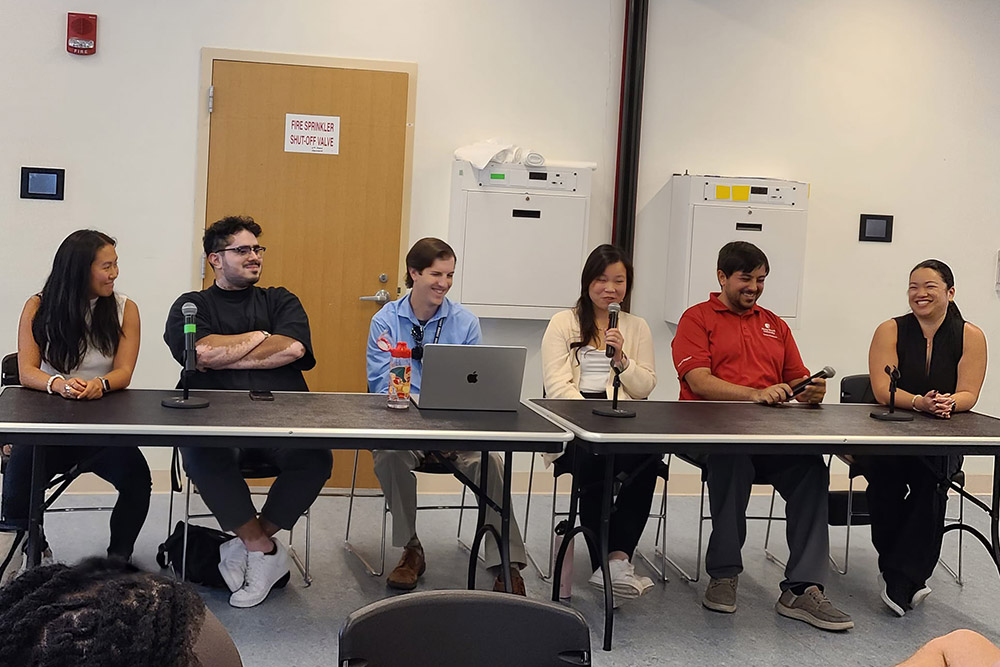Mentorship Matters: Alumni Support for DoIT Student Employees
This article was originally posted on SBU News.
For student employees in Stony Brook University’s Division of Information Technology (DoIT), mentorship from alumni who navigated the same roles and challenges faced as former DoIT student employees is invaluable.

As part of DoIT’s 32nd annual Bootcamp — an annual retreat for student employees to connect with one another and with staff — five alumni served on a panel to discuss their journeys from DoIT undergraduate student employees to full-time professionals.
Simeon Ananou, chief Information officer and vice president for DoIT, welcomed the group and emphasized the importance of compassion, humanity, humility, and curiosity. He reminded students that while their student employment is important, “your first assignment while you’re here is to be a good student, and we are glad that you’re bringing your talents and expertise to us to complement the work that we do so that we can serve the rest of the campus.”
Michael Basile, customer solutions support manager, moderated the August 23 alumni panel, which featured Jenny Chan ’04, consulting user assistance developer at Oracle; John Glenis ’23, systems engineer II at Raytheon; Rezvan Nafee ’23, junior full stack developer at SupplyHouse; Joy Yim ’22, lead acquisitions manager at Cash4Keys; and Angel Zou ’21, research program coordinator at the World Trade Center Health Program.
Panelists shared their career journeys, highlighting the value of skills learned at Stony Brook in their roles as DoIT student employees, such as communication, time management, and teamwork, and noted that these skills are transferable to fields outside of IT.
Yim pivoted from her degree in occupational therapy to working for a real estate company, but uses the skills learned while working in DoIT in her current profession.
“When I started working at DoIT during my freshman year, I didn’t know how to call a person on the phone. I was so shy, and I lacked confidence,” she said. “The staff work with you to be confident and capable of taking any path, and that allowed me to pivot from healthcare to real estate easily, because it’s not the technical things that you learned, but it’s the people skills, building relationships, the network communication. These are valuable skills, regardless of major.”
Chan stressed the importance of teamwork, and of having confidence in your own abilities. “When I first started working, I had imposter syndrome. I knew what I was doing, but I was always afraid to speak up. I was always very quiet,” Chan said. “I got to the point where I realized that I need other people’s help to do my job, and I need them to give me the information that I need to do my job. Everyone has a role to play, and they are all connected. To be successful, you need to be able to ask for help.”
Yim spoke about the importance of finding a mentor when you assume a new role, and when prepared, to share your experience by serving as a mentor for others. “The first thing that I knew I had to do when I began working in real estate was to find a mentor, and then when new people came onto our team, I was able to train them because I had someone feeding into my growth and development. It’s really the whole idea of giving back, and creating a cycle of support.”
Chan advised students to “embrace fear and don’t be afraid to make decisions or mistakes.” Stony Brook, added Zou, is an ideal environment to experiment and to make mistakes. “This is a great place to ask dumb questions and make mistakes, because the staff here just wants to see you grow. If you make a mistake, that’s okay. That’s life, and this is the perfect place to learn from that, where it’s very forgiving and kind.”
Following the alumni panel, additional alumni (including current DoIT employees) met in small groups with students to address specific student questions. DoIT employees have presented at several conferences about the power of empowering student employees. Their high impact practices are highlighted in the book A Good Job: Campus Employment as a High-Impact Practice.
Mentorship from alumni who were once in their shoes helps the student employees develop a clearer vision of their future, and offers them the support needed to achieve their professional goals.
— Beth Squire
